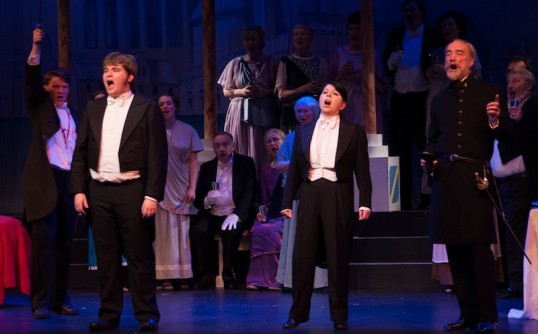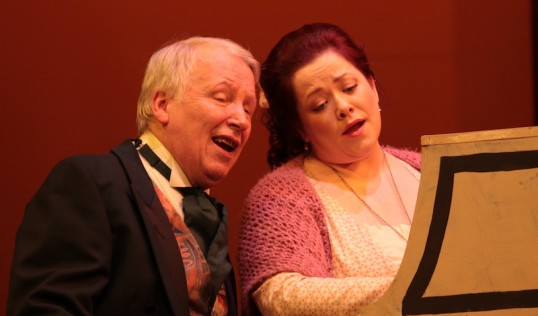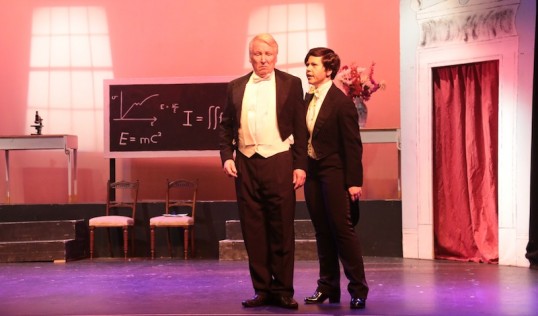The Tales of Hoffmann
★★★☆☆ Enjoyable fantasy
Church Hill Theatre: Wed 7 – Sat 10 October 2015
Review by Hugh Simpson
Lively and hugely likeable, Opera Camerata’s production of The Tales of Hoffmann is a largely pacy and accomplished affair.
Offenbach’s opera, familiar to many from Powell and Pressburger’s celebrated film, is based on three stories by E.T.A. Hoffmann (whose work was also the origin of The Nutcracker). A fictionalised version of Hoffmann is the central character, who tells the story of the three great unhappy loves of his life to an audience in a tavern.
All three stories have elements of the fantastic or supernatural, and are played largely for laughs, but otherwise have little in common. Cohesion is sometimes given by having the same artistes play the three love interests and the three villains, but that is a tall enough order for the strongest professional performers.
Instead, director Elspeth Williamson has wisely played up the contrasts between the three acts. Act One – the story of the ‘living doll’ Olympia that also inspired the ballet Coppélia – has a fairy-tale intensity; Act Two’s tale of dying soprano Antonia is a sinister melodrama, while louche, Venice-set exoticism is the order of the day in Act Three’s story of courtesan Giulietta and the magician Dapertutto.
These differences are pointed up further by excellently chosen costumes. There are also some clever and effective changes of scenery; however, the change between Acts Two and Three is protracted. When coupled with the lack of an interval at this point, this means that the third act starts to drag a little. This shows why a decision has often been made to switch the running order of the last two acts – something which the fragmented nature of the plot makes easy enough.
strength and presence
Mike Towers (Hoffmann) and Susanne Horsburgh, in the ‘trouser role’ of his friend Nicklausse, both possess enough strength and presence to knit together the various strands of the narrative. Perhaps because the roles are only theirs on alternate nights (they alternate with Michael Doroszenko and Barbara Scott) they throw everything into the performances, with Towers in particular displaying real power.
Towers may be on the old side for the young lover, while the removal of the introductory story (about the Muse posing as Nicklausse in order to make Hoffmann abandon love for poetry) makes the whole thing even more difficult to understand. However, these quibbles do not detract from the performances. Both are also accomplished actors, staying securely in role when they are not singing – which is not always the case.
The role of Olympia gives Nina Kopparhed a chance to show off her very impressive range as a coloratura soprano as well as some effective comedy, while Gillian Robertson is a remarkably strong-voiced and lyrical Antonia. Angela Estrada’s Giulietta is similarly accomplished even if she does not quite have the magnetism of the other two.
sympathetic turn
The villains of the stories are well defined and differentiated – George Ross’s OTT Coppélius, Richard Mein’s oily and saturnine Dr Miracle and Roger Robertson’s icily diffident Dapertutto all manage to make their characters clear from the outset. What is less successful is the way that their voices are sometimes drowned out; this also affects Mike Smith’s sympathetic turn as Antonia’s father and Catherine Harkin as his wife’s spirit.

Michael Doroszenko (alternate Hoffman), Barbara Scott (alternate Nicklausse) and Roger Robertson. Photo Mark Adams
This is a problem throughout the production; when two or more of the principals are singing together, the stronger voices tend to obliterate the weaker, leading to a lack of clarity. This is not so much of a problem with the chorus, who are admirably clear throughout, helped greatly by a sympathetic orchestra under the flexible direction of Alison Rushworth.
There are a couple of very successful comic turns – Stuart Clelland is open-faced and jolly as Olympia’s creator, Graham Drew displays excellent timing as a variety of servants, and Alexander MacLaren’s gormless Schlémil has a wide variety of bemused expressions.
The performances as a whole are hugely likeable and go a long way to reconciling the humour on display with its obvious darker themes. While the initial momentum of the piece becomes dissipated by the end, it remains a thoroughly enjoyable production.
Running time 2 hours 25 mins (one interval)
Church Hill Theatre, 33a Morningside Road, EH10 4DR
Wednesday 7 – Saturday 10 October 2015
Evenings 7.30 pm
Details and tickets from http://www.usherhall.co.uk/






















